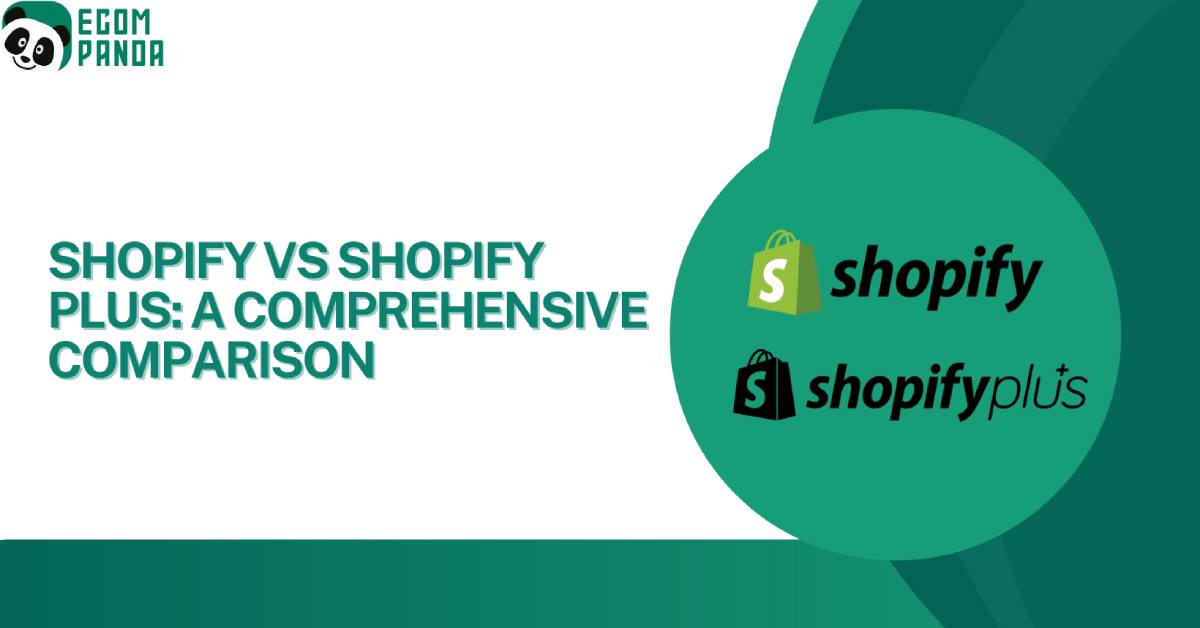Introduction
Brief description of the topic – “Shopify vs Shopify Plus: A Comprehensive Comparison.”
In the digital age where e-commerce has rapidly become the forefront of retail, the significance of selecting an optimal platform for your online business cannot be overstated. This article will focus on a comprehensive comparison of two major e-commerce platforms – “Shopify vs Shopify Plus.” We will examine their features, functionality, pricing, and the types of businesses each platform best serves.
Importance of understanding the differences between Shopify and Shopify Plus for businesses.
Shopify and its premium version, Shopify Plus, cater to a diverse range of business sizes and needs. Both platforms provide a robust foundation for online sales, yet they offer different features, services, and pricing structures. For businesses, comprehending these differences is critical because the choice between Shopify and Shopify Plus can greatly affect operational efficiency, customer experience, and ultimately, the bottom line. The right choice can lead to growth and success, while the wrong one can result in inefficiency and unnecessary expenditure.
Brief overview of what to expect in the article.
In this article, we delve deep into the “Shopify vs Shopify Plus” discussion, starting with a detailed introduction and overview of each platform. This is followed by a thorough comparison of their features, analyzing each platform’s strengths and weaknesses. We will also explore pricing structures, supported by case studies to provide practical context. Finally, we conclude with a summary of the pros and cons of each platform. The goal is to equip you with a comprehensive understanding of “Shopify vs Shopify Plus” to help you make the best decision for your e-commerce venture.

Table of Contents
What is Shopify?
Brief History and Description of Shopify
Shopify, a Canadian company, was founded in 2006 by Tobias Lütke, Daniel Weinand, and Scott Lake after they struggled to find a satisfying e-commerce solution for their online snowboard store. Over the years, Shopify has grown exponentially, transforming from a small scale solution to a globally recognized e-commerce platform serving over a million businesses in more than 175 countries.
Shopify is a comprehensive e-commerce platform that allows businesses to start, grow, and manage their online store. It provides a range of services including payments, marketing, shipping, and customer engagement tools.
Who Uses Shopify and for What Purposes?
Shopify is used by a wide range of businesses, from small startups and individual sellers looking to launch their online stores to larger businesses wanting to expand their online presence. It’s ideal for businesses that prefer a user-friendly platform that simplifies the process of setting up and running an online store.
Furthermore, Shopify caters to various sectors including retail, fashion, electronics, furniture, and more. It’s also used by businesses selling digital products, services, and events.
Key Features of Shopify
- User-Friendly Platform: Shopify offers an intuitive interface that is easy to use even for beginners, making the process of setting up an online store relatively simple.
- Customizable Storefront: Shopify provides a variety of themes (both free and paid) that businesses can customize to match their brand identity.
- Integrated Payment Gateway: Shopify comes with its own payment gateway, Shopify Payments, and also supports a wide array of third-party payment processors.
- Multichannel Selling: Shopify allows businesses to sell on multiple channels including web, mobile, social media, online marketplaces, and physical locations.
- SEO and Marketing Tools: Shopify includes SEO features and marketing tools to help businesses reach their target audience and boost sales.
- Inventory Management: Shopify includes an integrated inventory management system that simplifies the process of managing, tracking, and updating the store’s inventory.
- 24/7 Customer Support: Shopify provides round-the-clock customer service, ensuring businesses can get help whenever they need it.
What is Shopify Plus?
Brief History and Description of Shopify Plus

Shopify Plus was launched in 2014 as the enterprise-level offering of Shopify, designed to meet the needs of larger, more complex businesses and high-volume merchants. Since its inception, it has grown rapidly and now powers some of the world’s largest brands and companies.
Shopify Plus builds on the core functionality of Shopify, providing an advanced e-commerce platform with enhanced customization, automation capabilities, and dedicated support. With the ability to handle high levels of site traffic and sales, Shopify Plus is an ideal solution for large-scale online stores.
Who Uses Shopify Plus and for What Purposes?
Shopify Plus is primarily used by large enterprises and high-volume merchants. This includes well-known brands and multinational corporations that require an e-commerce platform capable of handling a significant amount of traffic, transactions, and inventory management.
These businesses often seek the advanced features of Shopify Plus to fully customize their online stores, automate tasks, integrate with other systems, and provide a highly personalized shopping experience for their customers.
Key Features of Shopify Plus
- High Scalability: Shopify Plus can handle over 10,000 transactions per minute, providing the robustness necessary for large businesses and peak sales periods.
- Advanced Customization: Shopify Plus offers enhanced customization options, including a fully customizable checkout experience.
- Automation with Shopify Flow: Shopify Flow is an exclusive tool for Shopify Plus users that allows businesses to automate tasks and processes.
- Dedicated Support: Shopify Plus merchants receive dedicated support from a Merchant Success Manager and 24/7 priority support.
- Multiple Stores: Shopify Plus merchants can manage up to 20 stores from a single account, making it ideal for businesses operating in multiple countries or languages.
- Wholesale Channel: Shopify Plus includes a built-in wholesale channel, allowing businesses to easily create a separate, password-protected wholesale store.
- Exclusive APIs: Shopify Plus offers additional API calls exclusive to the platform, enabling businesses to create more integrated and complex systems.
“Shopify vs Shopify Plus”: Overview
Broad Comparison of Shopify and Shopify Plus
Shopify and Shopify Plus are both robust e-commerce platforms offered by the same company, with the core difference lying in the scale and type of businesses they target. Shopify, being a more general solution, is aimed at small to medium-sized businesses, offering all the necessary features to run an online store efficiently. It is user-friendly, affordable, and provides adequate customization options for most businesses.
On the other hand, Shopify Plus is the enterprise-grade solution that is geared towards large businesses and high-volume merchants. It offers advanced features like higher levels of customization, automation, multi-store management, exclusive APIs, and a dedicated support team. Shopify Plus can also better handle large amounts of traffic and transactions, making it more suitable for businesses that experience high sales volumes.
Scenarios where Shopify may be more Suitable
- Startup Businesses: Shopify is a great choice for startups or businesses with a limited budget as it offers a cost-effective platform with all the basic e-commerce functionalities.
- Small to Medium-Sized Businesses: Businesses with moderate traffic and transaction volumes will find Shopify adequate for their needs.
- Ease of Use: Shopify is ideal for businesses that prefer a user-friendly platform that does not require advanced technical skills to set up and manage.
- Basic Customization: Businesses that require simple store customization can utilize Shopify’s extensive range of themes and basic customization features.
- Scenarios where Shopify Plus may be more Suitable
- High-Volume Merchants: For businesses processing high volumes of sales and experiencing substantial traffic, Shopify Plus provides the robust infrastructure necessary to handle this scale.
- Large Enterprises: Large companies looking for an e-commerce platform that can integrate with their existing systems (ERP, CRM, etc.) will find Shopify Plus beneficial.
- Advanced Customization: Businesses that want to create a unique customer experience through advanced store and checkout customization will find Shopify Plus more suitable.
- Automating Tasks: Businesses looking to automate tasks and workflows to enhance operational efficiency can benefit from Shopify Flow, a feature exclusive to Shopify Plus.
| Plan | Price Per Month | Number of Staff Accounts | Sales Channels | Transaction Fees | Support |
|---|---|---|---|---|---|
| Shopify Basic | $29 | 2 | Online Store, Buy Button, Local Pickup & Delivery | 2.0% (if not using Shopify Payments) | 24/7 Support |
| Shopify | $79 | 5 | In addition to Basic plan, Facebook, Instagram, eBay | 1.0% (if not using Shopify Payments) | 24/7 Support |
| Shopify Advanced | $299 | 15 | All Shopify sales channels | 0.5% (if not using Shopify Payments) | 24/7 Support |
| Shopify Plus | Starts at $2000 | Unlimited | All Shopify sales channels | Negotiable | Dedicated support team |
“Shopify vs Shopify Plus”: Features Comparison
Detailed comparison of the features in Shopify and Shopify Plus.
- Interface and User Experience
Both Shopify and Shopify Plus provide an intuitive and user-friendly interface. They offer a clean dashboard and easily navigable menus. However, with Shopify Plus, businesses get access to additional dashboards like the Shopify Plus Dashboard for managing multiple stores and the Shopify Flow dashboard for automating tasks. - E-commerce Capabilities
Shopify offers comprehensive e-commerce capabilities including product management, inventory tracking, order management, and multi-channel selling. Shopify Plus includes all these capabilities but also provides advanced features such as automated workflows via Shopify Flow, higher API call limit, and a built-in wholesale channel. - Customization Options
Shopify provides a variety of free and paid themes that can be customized to align with your brand. Shopify Plus goes a step further, offering fully customizable checkout experiences, greater access to the store’s code, and exclusive access to Shopify Scripts for advanced customization. - Payment and Shipping Options
Both platforms support a wide range of payment gateways and offer built-in shipping options. Shopify Plus, however, provides access to more advanced features, such as negotiated shipping rates with select carriers and the ability to customize shipping rules and rates using Shopify Scripts. - Marketing and SEO Capabilities
Shopify includes built-in SEO features, blogging capabilities, and integrates with various social media platforms for marketing. Shopify Plus offers all these, plus it allows for more advanced marketing capabilities through its exclusive APIs and integrations. - Customer Support
Shopify offers 24/7 customer support via email, live chat, and phone. Shopify Plus merchants, in addition to receiving 24/7 priority support, are assigned a dedicated Merchant Success Manager for personalized assistance and access to launch engineers for technical guidance during setup.
| Feature | Shopify | Shopify Plus |
|---|---|---|
| Interface and User Experience | User-friendly interface with clean dashboard | Additional dashboards for managing multiple stores and automating tasks |
| E-commerce Capabilities | Comprehensive e-commerce features including product and order management | Advanced features like automated workflows, higher API call limit, built-in wholesale channel |
| Customization Options | Variety of customizable themes | Fully customizable checkout, greater code access, exclusive access to Shopify Scripts |
| Payment and Shipping Options | Supports various payment gateways and built-in shipping options | Advanced shipping features, customizable shipping rules, negotiated shipping rates |
| Marketing and SEO Capabilities | Built-in SEO features, blogging capabilities, social media integration | Advanced marketing capabilities through exclusive APIs and integrations |
| Customer Support | 24/7 support via email, live chat, and phone | 24/7 priority support, dedicated Merchant Success Manager, access to launch engineers |
“Shopify vs Shopify Plus”: Pricing
Breakdown of Pricing for Shopify
Shopify offers three main pricing plans, each with its own set of features:
Basic Shopify ($29/month): This plan provides all the basics for starting a new business, including two staff accounts, an online store, unlimited products, and 24/7 support.
Shopify ($79/month): Aimed at growing businesses, this plan offers five staff accounts, professional reports, and lower credit card rates.
Advanced Shopify ($299/month): This plan is for scaling businesses. It provides fifteen staff accounts, advanced report builder, third-party calculated shipping rates, and the lowest credit card rates.
In addition, Shopify charges transaction fees unless you’re using Shopify Payments.
Breakdown of Pricing for Shopify Plus
Shopify Plus pricing typically starts at around $2000 per month but can increase based on the specific needs and scale of the business. Shopify Plus’s pricing is also affected by a variety of factors such as the volume of sales, level of customization, and additional services required.
Unlike Shopify, Shopify Plus does not have transaction fees if you use Shopify Payments. It also offers lower rates for other payment gateways.
Cost-effectiveness Analysis of “Shopify vs Shopify Plus”
The cost-effectiveness of Shopify and Shopify Plus largely depends on the scale and needs of your business.
For small to medium-sized businesses, Shopify’s regular plans will likely be the most cost-effective. They provide all the necessary features to run an online store at a fraction of the cost of Shopify Plus.
On the other hand, for large businesses and high-volume merchants, the advanced features, scalability, and support offered by Shopify Plus can easily justify its higher price point. The absence of transaction fees and lower rates for payment gateways can also result in significant savings for businesses with high sales volumes.
Thus, while Shopify Plus has a higher upfront cost, its advanced capabilities and potential savings could make it the more cost-effective option for larger businesses.
| Shopify | Shopify Plus | |
|---|---|---|
| Pricing Plans | – Basic Shopify ($29/month) – Shopify ($79/month) – Advanced Shopify ($299/month) | Starts around $2000/month, varies based on business needs |
| Features | Depends on the plan, includes online store, staff accounts, reporting, and 24/7 support | Advanced features, scalability, dedicated support, no transaction fees with Shopify Payments |
| Best for | Small to medium-sized businesses | Large businesses, high-volume merchants |
| Transaction Fees | Yes, unless using Shopify Payments | No, if using Shopify Payments. Lower rates for other payment gateways |
| Cost-Effectiveness | Most cost-effective for small to medium-sized businesses | More cost-effective for larger businesses due to advanced capabilities and potential savings |
Feature Checklist
A checklist comparing the features of Shopify and Shopify Plus side by side. This can be a quick reference for readers to compare the key features at a glance.
| Feature | Shopify | Shopify Plus |
|---|---|---|
| User-friendly Interface | ✔️ | ✔️ |
| Multi-Store Management | ❌ | ✔️ |
| Comprehensive E-commerce Capabilities | ✔️ | ✔️ |
| Advanced E-commerce Capabilities (Shopify Flow, etc.) | ❌ | ✔️ |
| Basic Store Customization | ✔️ | ✔️ |
| Advanced Store Customization | ❌ | ✔️ |
| Basic Shipping Options | ✔️ | ✔️ |
| Advanced Shipping Options (Negotiated Rates, Shopify Scripts) | ❌ | ✔️ |
| SEO and Marketing Capabilities | ✔️ | ✔️ |
| Advanced Marketing Capabilities (Exclusive APIs, Integrations) | ❌ | ✔️ |
| 24/7 Support | ✔️ | ✔️ |
| Dedicated Support (Merchant Success Manager, Launch Engineers) | ❌ | ✔️ |
| Basic Reporting | ✔️ | ✔️ |
| Advanced Reporting | Only in Advanced Shopify plan | ✔️ |
Case Studies: “Shopify vs Shopify Plus”
Case Study Showcasing the Use of Shopify
- Small Bookstore Finds Online Success with Shopify
Let’s consider the example of a small independent bookstore. Prior to the pandemic, their business was primarily brick-and-mortar with only a small percentage of sales coming from their rudimentary online store. When forced to close their physical location temporarily, they decided to move to Shopify.
They chose Shopify’s $79/month plan, which offered them an intuitive, user-friendly platform to set up their online store quickly. They were able to import their existing inventory, easily add new items, and manage their stock effectively. Shopify’s integrated payment and shipping options made order fulfillment straightforward. Additionally, they leveraged the SEO and marketing tools to reach a wider audience, boosting their online sales significantly. The move to Shopify helped them navigate through the tough period and even allowed them to expand their customer base beyond their local area.
Case Study Showcasing the Use of Shopify Plus
- Fashion Retail Giant Streamlines Operations with Shopify Plus
A leading fashion brand with a global presence found their existing e-commerce platform was struggling to handle their high sales volumes, particularly during peak shopping seasons. They decided to move to Shopify Plus.
The transition to Shopify Plus offered them scalability to handle thousands of transactions per minute without website crashes. They could also manage multiple international stores from a single account, enabling efficient control of their global operations. They utilized Shopify Flow to automate various processes, such as inventory management and customer tagging, improving their operational efficiency. The ability to customize their online store and checkout process in line with their brand identity led to increased customer engagement and conversion rates. Despite the higher cost, Shopify Plus provided the necessary robust infrastructure and advanced features to support their large-scale operations.
Comparison and Contrast of These Case Studies
These case studies showcase how both Shopify and Shopify Plus can be effective solutions depending on the scale and requirements of a business.
The small bookstore required an affordable, easy-to-use platform with basic e-commerce capabilities to expand their online sales – Shopify was the perfect fit.
In contrast, the fashion brand needed a platform capable of handling high volumes of traffic and sales, providing advanced customization and automation, and streamlining their global operations – making Shopify Plus the ideal choice.
Thus, while the “Shopify vs Shopify Plus” decision involves considerations of cost, both platforms can deliver value and support business growth when matched with the right business needs and scale.
Pros and Cons: “Shopify”
Pros
- Affordable Pricing: Shopify’s pricing plans are more accessible to smaller businesses, making it a cost-effective solution for online selling.
- Ease of Use: The platform is intuitive and user-friendly, making it easy for beginners to set up and manage their online store.
- All-in-One Platform: Shopify provides a range of features necessary for e-commerce, including inventory management, SEO tools, and multichannel selling.
- 24/7 Support: Shopify offers round-the-clock customer support through email, live chat, and phone.
Cons
- Transaction Fees: Unless you’re using Shopify Payments, transaction fees are applied on every sale.
- Limited Customization: While Shopify does provide customization options, they’re not as extensive as those offered by Shopify Plus.
- Scalability: Although Shopify can handle a decent amount of traffic and transactions, it may struggle with extremely high volumes that large businesses may experience.
Pros and Cons: “Shopify Plus”
Pros
- Advanced Features: Shopify Plus offers advanced features like automation, a customizable checkout process, and exclusive APIs, providing a more powerful solution for e-commerce.
- High Scalability: Shopify Plus is built to handle high volumes of traffic and transactions, making it suitable for high-volume merchants and large businesses.
- Dedicated Support: Shopify Plus merchants receive dedicated support, including a Merchant Success Manager for personalized assistance.
- Greater Customization: Shopify Plus provides greater access to the store’s code for more extensive customization.
Cons
- Costly: With pricing starting at around $2000 per month, Shopify Plus can be prohibitively expensive for smaller businesses.
- Complexity: With its advanced features and extensive customization, Shopify Plus can be more complex to set up and manage, which may require a dedicated team or external experts.
Conclusion: Choosing Between Shopify and Shopify Plus
Recap of “Shopify vs Shopify Plus: A Comprehensive Comparison”
Our comprehensive comparison of Shopify vs Shopify Plus has explored their main differences, similarities, features, pricing, and ideal use cases. Shopify, a platform perfect for small to medium businesses, offers affordable plans and all the necessary tools for online selling. On the other hand, Shopify Plus, designed for high-volume merchants and large businesses, provides advanced features, scalability, and dedicated support, all while offering a greater degree of customization.
Suggestions for Different Types of Businesses
For startups, small, and medium businesses with modest sales volumes and budget constraints, Shopify’s regular plans offer a cost-effective solution, providing all necessary features to set up and run an efficient online store. However, as your business grows, you may find the need for more advanced features, which is where Shopify Plus comes into the picture.
For high-volume merchants, large enterprises, and businesses with specific needs in terms of customization, automation, and integration with other systems, Shopify Plus is the ideal solution. Despite the higher cost, the advanced capabilities, scalability, and dedicated support of Shopify Plus can easily justify the investment for businesses operating at this scale.
Final Thoughts on the “Shopify vs Shopify Plus” Comparison
The choice between Shopify and Shopify Plus ultimately depends on the scale, needs, and budget of your business. Each platform has its strengths, and the decision should be guided by what is most beneficial for your business growth and customer satisfaction. Whether you opt for Shopify or Shopify Plus, rest assured that you will be investing in a reliable, robust, and dynamic e-commerce platform.
Frequently Asked Questions
What is the difference between Shopify and Shopify Plus?
Shopify and Shopify Plus are different tiers of the Shopify platform. Shopify is suitable for small to medium businesses, offering all the essential tools needed for an online store. Shopify Plus is a more advanced solution designed for enterprise-level businesses with higher volume sales and more complex needs. It offers advanced features like API support, unlimited bandwidth, higher customization, and dedicated support.
What is the benefit of Shopify Plus?
Shopify Plus offers several benefits, including advanced customization options, priority customer support, more robust reporting and analytics, automation tools, increased API limits, and the ability to handle high volume traffic and transactions. It also provides access to exclusive apps and features designed for larger businesses.
Is Shopify Plus part of Shopify?
Yes, Shopify Plus is part of the Shopify platform. It is the top-tier plan offered by Shopify, designed to cater to the needs of enterprise-level businesses.
How many websites can I have on Shopify Plus?
With Shopify Plus, you can have up to ten storefronts at no additional cost. This includes international, wholesale, and pop-up storefronts. If you need more than ten, additional costs will apply.
What is a better option for Shopify?
The choice between Shopify plans depends on your specific business needs. If you're a small to medium-sized business just starting with e-commerce, a lower-tier Shopify plan like Basic or Shopify might be sufficient. If you're an enterprise-level business with a high volume of sales, complex needs, and requiring more customization, Shopify Plus would be the better option.







